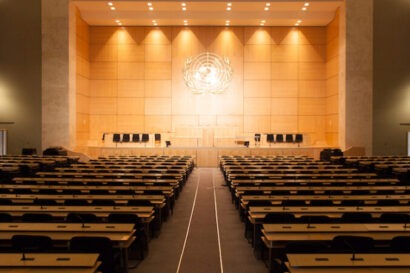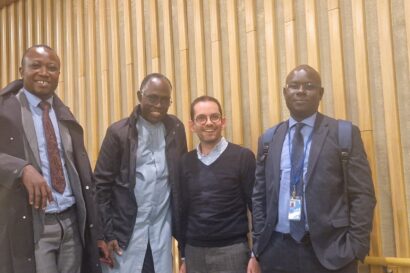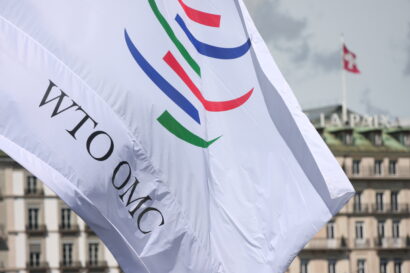After three weeks of intense negotiations at the Second Session of the Ad-hoc Committee, draft terms of reference (TOR) for a UN Framework Tax Convention were finally adopted with a vote last month.
Was this negotiation a success, and if so for whom?
Many civil society commentators emphasised that only very few countries voted “no” on the draft. Indeed, some countries which had previously voted against last year’s resolution 78/230 or abstained have now been won over (Costa Rica, El Salvador, Mexico, and Peru), whilst a large group – the EU plus countries closely connected to it – abstained despite previously voting against. Meanwhile the coalition of supporters remained largely stable. More sceptical commentators note, however, that the remaining opponents included significant economic powers such as Japan, the UK and the US.
Observations from the conference room
In this blog, I first look at the main deals that were struck in New York last month, based on my own observations from the conference room.
Let’s start by recalling that the main object of the negotiations was reviewing the role of the UN in global tax governance. Most of the global South was in favour of broadening its mandate whereas most of the global North preferred a narrower role.
Arguing that the former was largely successful in its aims, I then analyse how several features inherent to working at the UN that became apparent during this second session can/will work to the advantage of lower income countries and I reflect on challenges for the process lying ahead.
Broader mandate for the UN on tax secured
The basis for the negotiation was a revised draft ToR prepared by the Committee’s Chair after written inputs were received on an earlier draft (I used MS word to compare that version with the final ToR at the end of the session).
At the beginning of the session, this initial draft was received more favourably by representatives from the global South than those from the global North. Most requests for amendments therefore came from the latter group. Their focus? Leaving as many issues as possible open for negotiation in the following years: “could instead of should” became somewhat of a slogan. In general, they were not very successful in this endeavour.
From the perspective of the global South, the biggest achievement of the second session was probably that “taxation of cross-border services in a globalized economy” was defined as first “early” protocol topic to be worked on in parallel to the negotiation of the framework convention itself. There will also be one other early protocol (still to be chosen from a list). In return, a longer time horizon was agreed for the development of both the convention and the early protocols (3 instead of 2 years).
Most key principles and commitments were upheld, such as the fair allocation of taxing rights and the principle that priorities, needs, and capacities of developing countries and countries in special situations will be respected. Hence the global South’s succeeded in securing a broad mandate for the subsequent negotiations.
Nevertheless, a few areas present in earlier drafts of the ToR have been watered down, most clearly around the taxation of high-net worth individuals (HNWI) and environmental taxation.
Areas such as taxing the wealthy and environmental taxes were watered down
With respect to high net worth individuals (HNWI), the focus was shifted to tax evasion and avoidance. The addition, “in relevant Member States”, seems to reaffirm countries’ freedom to act or not. So, no commitment to an internationally coordinated approach such as the one proposed by Brazil, currently holding the G20 presidency, and economist Gabriel Zucman.
The same could be said for the commitment on environment. This was diluted by placing it on the same level as the economic and social dimensions of sustainable development. What was agreed, however, may still set the basis for work in this area: Pakistan, for instance, expressed a hope that this commitment could reopen discussions on unilateral measures such as the EU Carbon-Border Adjustment Mechanism (CBAM) within the UN forum.
All in all, decreased ambition here may be more disappointing for civil society actors as well as for Latin American and small island states than for the African group and its allies. Pursuing ambitious international projects on the taxation of HNWI may not be Africa’s current priority, and some African countries had pointed out the importance of leaving space for industrial development when addressing environmental challenges.
This illustrates once again the central role of the African group in the whole process.
Bringing tax negotiations to the UN: an advantage for the global South?
In addition to my colleague Martin Hearson’s analysis of the differences between the ad-hoc committee process and other international tax fora (apart from the obvious impact of majority voting), the Second Session made a few more important features of the intergovernmental UN setting apparent.
Firstly, negotiating at the UN meant that tax discussions are no longer isolated from other UN debates. For instance, even though many tax experts were concerned about the lack of common understanding around the term “illicit financial flows”, the existence of previous UN resolutions that use the term as well as a definition developed by UNCTAD paved the way for its inclusion in the ToR. Due to the strong development focus of previous UN instruments, the influence of these kinds of precedents likely works to the advantage of the global South.
Secondly, there is a strong routine of working in alliances, despite disagreements on details. Even though during the discussions, countries within the broader global South bloc or even within narrower regional blocs sometimes voiced differing opinions, they nevertheless supported each other in the final vote. Similarly, the EU displayed cohesion despite reports of internal disagreements. The global South has been most effective in OECD negotiations when it has been able to negotiate as a bloc, but this is still relatively rare, not least because of diplomatic pressure exercised behind the back of technical negotiators.
Thirdly, despite the high-level of public participation, discussion towards reaching real compromises still requires a non-transparent format: the so-called “informal informal” sessions and bilateral discussions, which are conducted at the exclusion of observers and the general public. Clearly, the draft text advanced most during these moments. Whether this will work in favour or against the global South remains to be seen.
Challenges ahead
While this first year of negotiations was clearly focused on securing a sufficiently broad mandate for the process, the coming years will need to deliver substantive outcomes.
For those championing the UN process, a key strategic decision will be whether to focus on incremental improvements to the status-quo (which would require seeking broad consensus with countries in the global North) or whether to develop more ambitious solutions that would likely result in a system that moves at different paces, at the expense of involving the global North at every step.
Note that this would mirror how the OECD used to work in the past. Other countries may still sign up to later to ambitious proposals agreed by a minority, perhaps when a domestic political circumstances are right for it.
Regardless of the choice, having a greater number of global South countries engaged in the discussions will become more important. If attending meetings at the UN is not feasible for them, regional organizations could play a crucial role in ensuring an inclusive process for building a common regional agenda. While having only few countries (such as Nigeria, Kenya, Ghana, and Senegal leading the African Group) speak on behalf of a large group is efficient in negotiations and viable for the initial debate focused on getting the work on track, it is important that the views of those not yet actively participating influence the concrete policies to be produced in the next years.
Finally, discussion needs to start about how to design protocols on substantive issues. The possibilities for this are ample. As I expressed during the multistakeholder dialogue in the first week, protocols do not necessarily need to look like articles in Model tax conventions or like other multilateral documents such as the Pillar 1 convention, the Pillar 2 Model rules, or the CbCR minimum standard. They could instead include commitments about when to use pre-existing technical solutions, in line with the principles agreed in the framework convention.
The Dutch 2020 tax treaty policy memorandum, which outlines the UN Model articles that the Netherlands would be ready to accept in negotiations with different groups of countries (e.g. developing countries or least developed countries), as well as the political agreement around the Pillar 2 subject-to-tax rule are interesting examples, more for their format than for their precise content. In a similar approach, a protocol to the UN Framework Convention could define under which conditions countries should be required to accept a demand for re-negotiation of certain treaty provisions, such as, for instance, on the taxation of cross-border services.
Final thoughts
So far, the UN format seems to be working well for the global South, but it is not guaranteed that it will be the case once negotiations move deeper into substantive terrain. The coming months will be crucial to develop, test, and exchange ideas so that more concrete proposals can emerge before negotiations start in early 2025.
Note on the title of this blog: Ramy Youssef, the Chair of the ad-hoc committee, said in his closing speech: “I think we reached an outcome that leaves no winners or losers, rather it is my honest belief that the outcome the Committee was able to make all of us and the Member States, and the citizens of the world you collectively represent, clearly winners.”
With thanks to Martin Hearson and Mbakiso Magwape for their comments and inputs.




